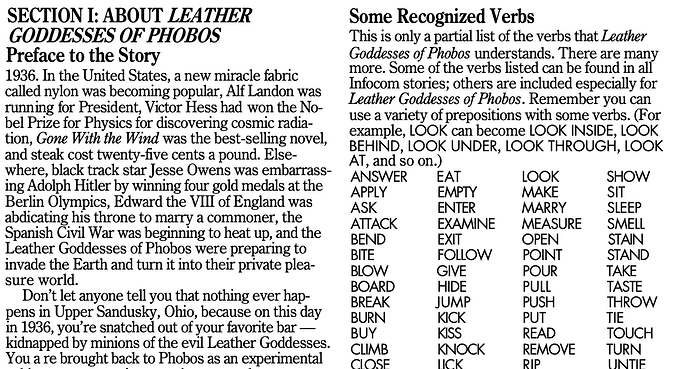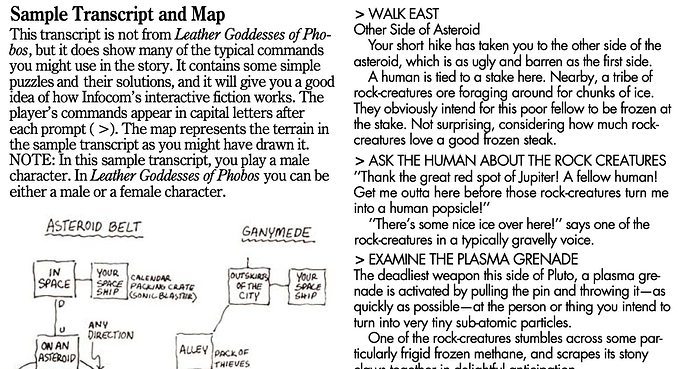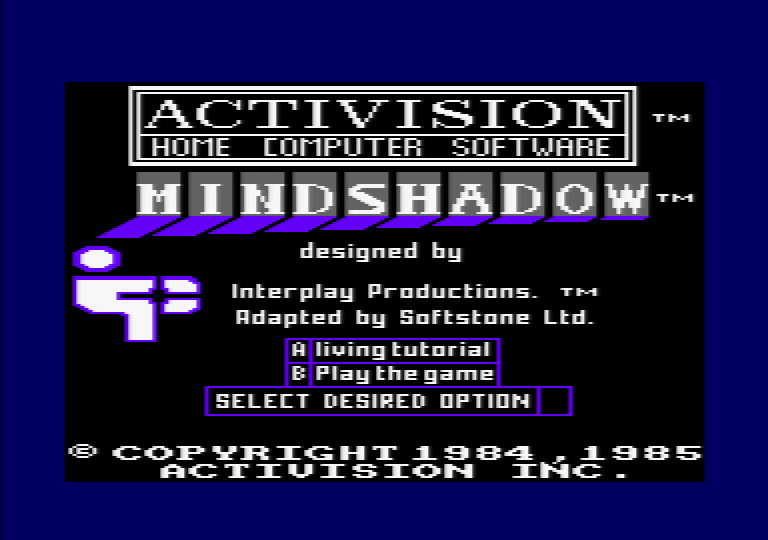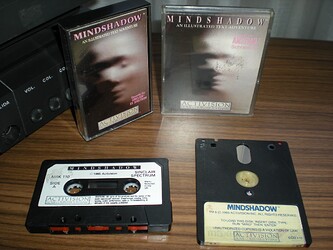That is a good point. I wonder how people learned how to play at the beginning. I remember having to type 2 word commands, and for the longest time (still do, btw), that’s what I do, even when playing Infocom games! Very rare adjectives and no adverbs at all.
In the beginning, games, even ones hastily stapled into plastic bags, came with instructions.
My first text adventure, Pirate Adventure on the TI-99/4A, had a little manual about how to play. I was 9 or 10 and had never heard the word inventory before, but I learned it from the manual. Pirate Adventure had persistent inventory on screen, but not all of the games did. When I played one that didn’t, I remembered to type I. The manual used TAKE, so it was a few years before I found out that GET would work. EXAMINE and WEAR were other verbs that I might not have thought of if they hadn’t been in the manual.
Conventional wisdom says no one reads instructions, but I always have.
I have always disliked autosaving. I turn it off any time I can.
Are you guys saying that modern games don’t have instructions or a help system?
I haven’t played anything recent yet, but the early games used to ask if you needed instructions when you started, had at least a short introduction included with the packaging and would explain to use “restore” to load when you saved a game.
Of course, back in the 20th century we had time to read manuals while we waited for the game to load.
Modern games should have instructions and a help system. I know for a while videogames started leaving this behind, asserting that gamers know what to do already, but that proved shortsighted.
More recent games—anywhere from indie to AAA—are releasing with tutorials and built-in manuals for reference, both because any title could be someone’s first game, and also because adults with busy lives might need to wait weeks before coming back to a game, and will need a mid-story refresher.
If you mean modern IF games: I don’t have as much data on that. I know that TADS 3 includes a default help system, so theoretically any TADS game can try to detect patterns exhibited by new parser players and provide nudges and tutorial resources.
Yes, I meant recent parser games.
I have played recent point and click adventures, such as the Siberia and Book of Unwritten Tales series.
On tutorial, I remember an 8-bit era text/graphic adventure (on disk, probably Apple II ?) with a tutorial adventure, loaded separately from a menu of the type 1-start tutorial 2-start [name of the adventure] 3-etc. I don’t remember what was, but back then I appreciate the little idea (the tutorial was also a sort of prologue, or appetizer, somewhat related to the adventure…)
on manual, with a bit of effort, I manage to bring together on a desktop the pdf reader and a pair of 8 bit emulator capable of emulating the original speed of the emulated drives (c-64 and apple ][, that is, the two extremes in floppy drive speed…) feeding them the same adventure and at the same time opening on the .pdf reader the appropriate docs, then also Emily’s 8-page tutorial.
Results: confirmed Wysardry’s note on late century, one can read at least a pair of page on apple ][ and up to four on c=64.
Best regards from Italy,
dott. Piergiorgio.
Interesting that you say that. [Loudly cribbles on conspicuous clipboard.]
A little late, but…
Jason Scott had posted a scan of Infocom sales figures a long time ago. The list ends with 1986:
https://www.flickr.com/photos/textfiles/albums/72157604579363487/
That’s kinda neat. So the tutorial was built as separate tiny game along with the main game that you could choose to ignore if you wished, but you were treated to a prologue if you played it. Very interesting. I like that quite a bit. Thank you for sharing that, dott. Piergiorgio.
If I remember what game was…
Best regards from Italy,
dott. Piergiorgio.
Infocom games usually provided extensive documentation and a sample walkthrough not based on the game to show example play.
MIndshadow (Activision, 1985) did that. The tape version had the tutorial in one side and the “real game” in the other while the disk based one offered the option to choose which one to load from the disk. I think there were a few other 80’s IF works that did the same.
Melbourne House’s The Lord of the Rings included an introductory adventure that was a easier version of the first part of the main game which had the problems simplified or removed.
I totally agree with J.J. Guest but… What if… it wasn’t?
Coming soon a spanish podcast with @Ruber_Eaglenest and yours truly just chatting about that. Stay tuned! ![]()
–



